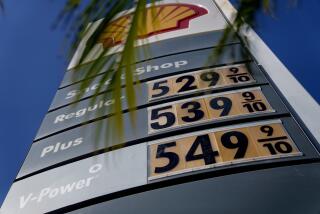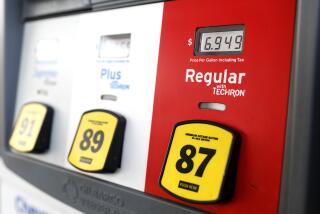Republicans see rising gas prices as political weapon to weaken Obama
As Republicans continue to cast about for ways to weaken President Obama in advance of next year’s elections, it appears they believe they have found one solid line of attack: rising gas prices.
The average cost of a gallon of gas has been rising over the $3 mark all year, hitting $3.39 this week. On Wednesday, the price for a gallon of crude oil surpassed $100 a barrel on the world markets. Unrest in the Middle East, particularly in the oil-rich state of Libya, as well as rising international demand, has many analysts believing gas in the U.S. could hit $4 a gallon by summer.
If that occurs, it may prove to be another test for Obama’s presidency. Earlier this week, Federal Reserve Chairman Ben Bernanke, testifying before Congress, called rising prices “a threat” to the economy’s recovery, although he suggested that the result would be a modest increase in consumer prices, not rampant inflation.
But President George W. Bush faced a similar spike in 2008, part of an economic downturn that helped erode whatever remaining popular support he enjoyed as his second term wound down. And, of course, an energy crisis, along with long lines at gas pumps, became synonymous with the final years of Jimmy Carter’s presidency.
During Wednesday’s press briefing at the White House, Press Secretary Jay Carney said Obama “is extremely aware of the impact a spike in oil prices can have on gasoline prices and therefore on the wallets and pocketbooks of average Americans.”
Carney said the administration is “confident that the global system has the capacity to deal with major disruptions in oil supply.” He would not address whether Obama was considering options such as opening the Strategic Petroleum Reserve, as was also discussed in 2008, to help bring prices down.
But Sen. Jeff Bingaman, a Democrat from New Mexico and chairman of the Senate Energy and Natural Resources Committee, called upon the president Wednesday to do just that.
“Between the lost production in Libya, the crude-oil dislocation associated with additional Saudi production, and the prospect of further turmoil in the region, we are now unquestionably facing a physical oil supply disruption that is at risk of getting worse before it gets better,” Bingaman said in Senate floor speech.
Republicans have been growing louder on the issue, particularly those from gas-producing states who maintain the administration hasn’t done enough to boost domestic energy production, and party insiders say the attacks may grow sharper as prices continue to rise.
Gov. Haley Barbour of Mississippi, a possible GOP contender for the 2012 presidential nomination, accused the president Wednesday of favoring higher gas prices as a means to push American consumers toward more energy-efficient cars.
“This administration’s policies have been designed to drive up the cost of energy in the name of reducing pollution, in the name of making very expensive alternative fuels more economically competitive,” Barbour told the U.S. Chamber of Commerce in Washington.
Barbour seized upon comments made by Energy Secretary Stephen Chu, who in 2008, before his nomination to that post, said European-style gas prices would be a key to driving energy reform in the U.S. Chu later backtracked from those remarks during his confirmation hearing, saying high fuel prices were harming the American economy.
Asked to address Barbour’s criticism, Carney said the remarks do not reflect Chu’s beliefs or White House policy, but added that the administration has been “very focused on the need precisely to develop other energy sources so that we are not as dependent on foreign oil as we have been in the past. That is right for economic reasons and right for national security reasons.
“Beyond that, I would just say that those comments were clearly made in the context of 2012 presidential politics, so you have to take them, I think, understanding that,” Carney said.
Interior Secretary Ken Salazar is expected to testify before a House committee Thursday, where he will likely face questions from Republicans about the lengthy permit approval process for offshore drillers in the wake of last year’s massive oil spill in the Gulf of Mexico.
On Thursday, Rep. Charles Boustany, a Republican from Louisiana, introduced a resolution that would direct Interior to streamline its permitting process.
“With so much unrest in North Africa and the Middle East, it is critical that American energy production gets up and running again,” Boustany said.
Peter Morici, an economist at the University of Maryland who is critical of Obama’s energy policies, said if gas hits $4 a gallon this year, “it would tank the recovery.”
But, he said, the GOP may not realize a huge political benefit regardless. “The public would blame conditions in the Middle East,” he said.
More to Read
Get the L.A. Times Politics newsletter
Deeply reported insights into legislation, politics and policy from Sacramento, Washington and beyond. In your inbox three times per week.
You may occasionally receive promotional content from the Los Angeles Times.






